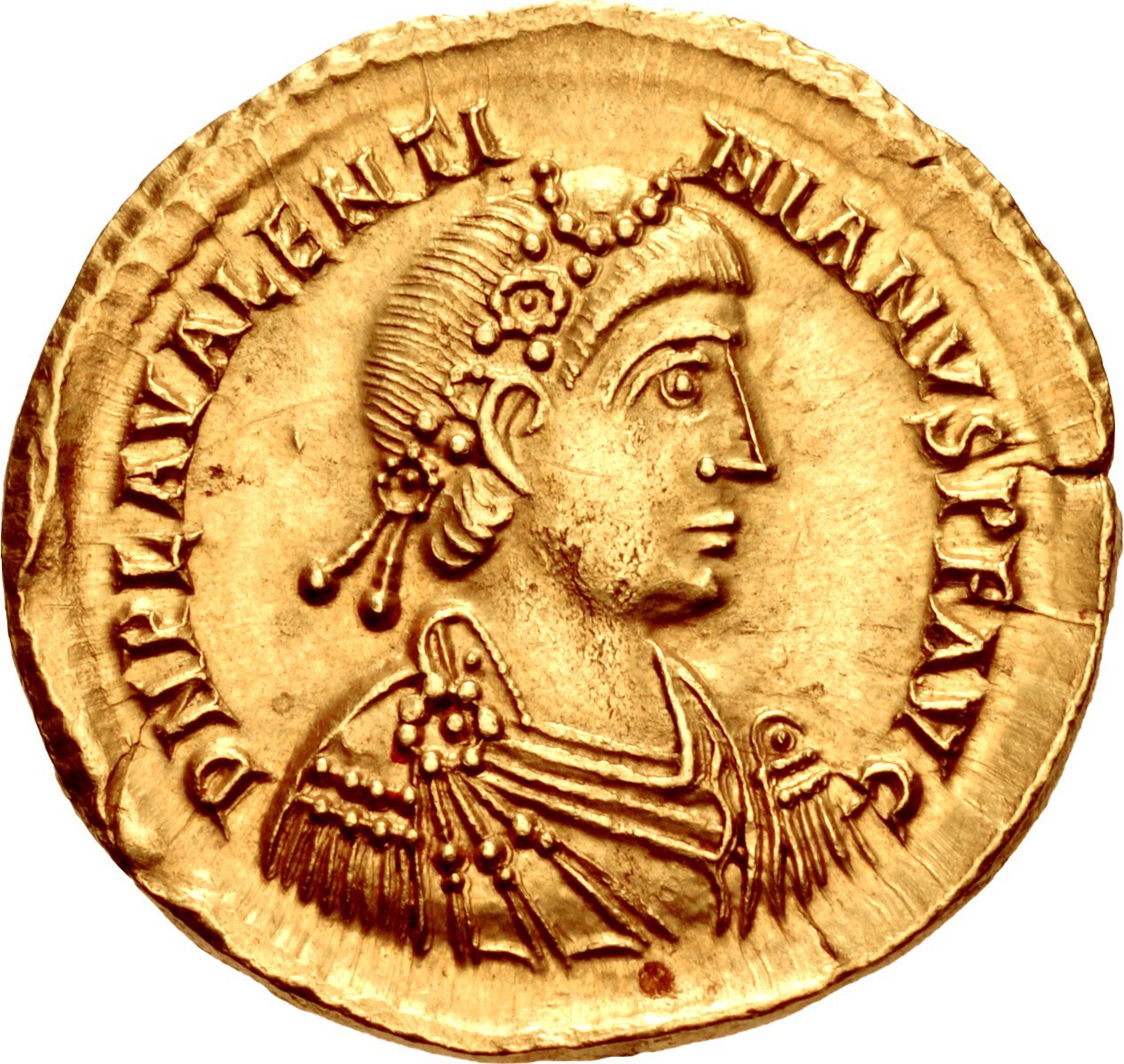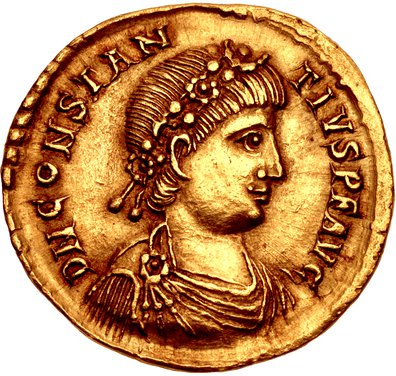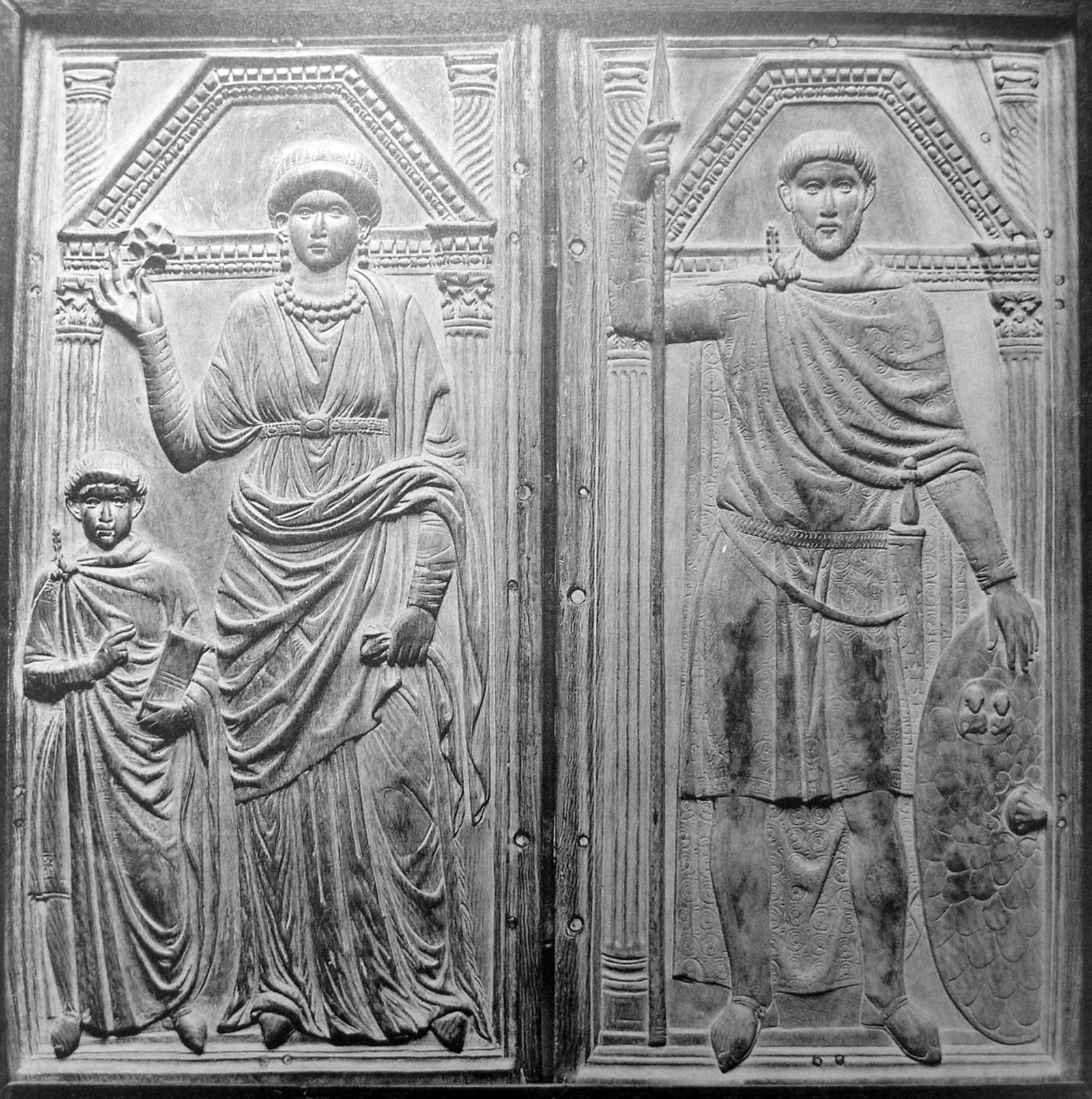|
Mausoleum Of Galla Placidia
The Mausoleum of Galla Placidia is a Late Antique Roman building in Ravenna, Italy, built between 425 and 450. It was added to the World Heritage List together with seven other structures in Ravenna in 1996. Despite its common name, the empress Galla Placidia (d. 450) was not buried in the building, a misconception dating from the thirteenth century; she died in Rome and was buried there, probably alongside Honorius in the Mausoleum of Honorius at Old Saint Peter's Basilica. History The "mausoleum" of Galla Placidia, built 425–450, is a cruciform chapel or oratory that originally adjoined the narthex of the Church of the Holy Cross (''Santa Croce'') in Ravenna. It was probably dedicated to Saint Lawrence. Aelia Galla Placidia, the likely patron of the building's construction, was the daughter of Theodosius I and Galla, the daughter of Valentinian I. Raised by Serena, wife of Stilicho, she was made ''nobilissima'' in her youth and granted a palace by her father in Const ... [...More Info...] [...Related Items...] OR: [Wikipedia] [Google] [Baidu] |
Ravenna
Ravenna ( , , also ; rgn, Ravèna) is the capital city of the Province of Ravenna, in the Emilia-Romagna region of Northern Italy. It was the capital city of the Western Roman Empire from 408 until its collapse in 476. It then served as the capital of the Ostrogothic Kingdom until it was re-conquered in 540 by the Byzantine Empire. Afterwards, the city formed the centre of the Byzantine Exarchate of Ravenna until the last exarch was executed by the Lombards in 751. Although it is an inland city, Ravenna is connected to the Adriatic Sea by the Candiano Canal. It is known for its well-preserved late Roman and Byzantine architecture, with eight buildings comprising the UNESCO World Heritage Site "Early Christian Monuments of Ravenna". History The origin of the name ''Ravenna'' is unclear. Some have speculated that "Ravenna" is related to "Rasenna" (or "Rasna"), the term that the Etruscan civilization, Etruscans used for themselves, but there is no agreement on this point. Ancien ... [...More Info...] [...Related Items...] OR: [Wikipedia] [Google] [Baidu] |
Saint Lawrence
Saint Lawrence or Laurence ( la, Laurentius, lit. "Laurel wreath, laurelled"; 31 December AD 225 – 10 August 258) was one of the seven deacons of the city of Rome under Pope Sixtus II who were martyred in the Persecution of Christians, persecution of the Christians that the Valerian (emperor), Roman Emperor Valerian ordered in 258. Life St. Lawrence is thought to have been born on 31 December AD 225, in Valencia (or less probably, in Huesca), the town from which his parents came in the later region of Aragon that was then part of the Roman province of Hispania Tarraconensis. The martyrs Orentius (Modern Spanish: ) and Patientia (Modern Spanish: ) are traditionally held to have been his parents.Sts. Orentius and Patientia Catholic Online Lawrence encountered the future Pope Sixtus II, ... [...More Info...] [...Related Items...] OR: [Wikipedia] [Google] [Baidu] |
Valentinian III
Valentinian III ( la, Placidus Valentinianus; 2 July 41916 March 455) was Roman emperor in the West from 425 to 455. Made emperor in childhood, his reign over the Roman Empire was one of the longest, but was dominated by powerful generals vying for power amid civil wars and the invasions of Late Antiquity's Migration Period, including the campaigns of Attila the Hun. He was the son of Galla Placidia and Constantius III, and as the great-grandson of Valentinian I () he was the last emperor of the Valentinianic dynasty. As a grandson of Theodosius I (), Valentinian was also a member of the Theodosian dynasty, to which his wife, Licinia Eudoxia, also belonged. A year before assuming the rank of ''augustus'', Valentinian was given the imperial rank of ''caesar'' by his half-cousin and co-emperor Theodosius II (). The '' augusta'' Galla Placidia had great influence during her son's rule. During his early reign Aetius, Felix, and the ''comes africae'', Bonifacius all competed ... [...More Info...] [...Related Items...] OR: [Wikipedia] [Google] [Baidu] |
Justa Grata Honoria
Justa Grata Honoria, commonly referred to during her lifetime as Honoria, (born ''c.'' 418 – died ''c.'' 455) was the older sister of the Western Roman Emperor Valentinian III. She is famous for her plea of love and help to Attila the Hun, which led to his proclamation of his claim to rule the Western Roman Empire. Coins attest that she was granted the title of Augusta not long after the accession of her brother in 426. Family Honoria was the only daughter of later Emperor Constantius III and Galla Placidia. Her first two names were after her maternal aunts, Justa and Grata, the daughters of Valentinian I and Justina, and the third for the emperor who reigned at the time of her birth, her half-uncle Honorius. Her maternal half-brother Theodosius, born in 414 from the first marriage of Placidia to king Ataulf of the Visigoths, died in infancy, before Honoria was born. Her younger brother, Valentinian III, was her full brother. Biography The historical record of most of her ... [...More Info...] [...Related Items...] OR: [Wikipedia] [Google] [Baidu] |
Constantius III
Constantius III was briefly Western Roman emperor of the West in 421. He earned his position as Emperor due to his capability as a general under Honorius, achieving the rank of ''magister militum'' by 411. That same year, he suppressed the revolt of Constantine III, a Roman general who had declared himself emperor. Constantius then went on to lead campaigns against various barbarian groups in Hispania and Gaul, recovering much of both for the Western Roman Empire. Constantius married Honorius's sister Galla Placidia in 417, a sign of his ascendant status, and was proclaimed co-emperor by Honorius on 8 February 421. He reigned for seven months before dying on 2 September 421. Life Early life Constantius was born in Naissus, Moesia (present-day Niš, Serbia) of Illyrian origin. Constantius served as a general under Honorius, rising to the rank of ''Magister militum'' (Master of the Soldiers) by 411. Revolt of Constantine III In 411 Constantius was sent by Honorius to put ... [...More Info...] [...Related Items...] OR: [Wikipedia] [Google] [Baidu] |
Patrician (ancient Rome)
The patricians (from la, patricius, Greek: πατρίκιος) were originally a group of ruling class families in ancient Rome. The distinction was highly significant in the Roman Kingdom, and the early Republic, but its relevance waned after the Conflict of the Orders (494 BC to 287 BC). By the time of the late Republic and Empire, membership in the patriciate was of only nominal significance. The social structure of Ancient Rome revolved around the distinction between the patricians and the plebeians. The status of patricians gave them more political power than the plebeians. The relationship between the patricians and the plebeians eventually caused the Conflict of the Orders. This time period resulted in changing the social structure of Ancient Rome. After the Western Empire fell, the term "patrician" continued as a high honorary title in the Eastern Empire. In the Holy Roman Empire and in many medieval Italian republics, medieval patrician classes were once again formal ... [...More Info...] [...Related Items...] OR: [Wikipedia] [Google] [Baidu] |
Visigoths
The Visigoths (; la, Visigothi, Wisigothi, Vesi, Visi, Wesi, Wisi) were an early Germanic people who, along with the Ostrogoths, constituted the two major political entities of the Goths within the Roman Empire in late antiquity, or what is known as the Migration Period. The Visigoths emerged from earlier Gothic groups, including a large group of Thervingi, who had moved into the Roman Empire beginning in 376 and had played a major role in defeating the Romans at the Battle of Adrianople in 378. Relations between the Romans and the Visigoths varied, with the two groups making treaties when convenient, and warring with one another when not. Under their first leader, Alaric I, the Visigoths invaded Italy and sacked Rome in August 410. Afterwards, they began settling down, first in southern Gaul and eventually in Hispania, where they founded the Visigothic Kingdom and maintained a presence from the 5th to the 8th centuries AD. The Visigoths first settled in southern Gaul as ... [...More Info...] [...Related Items...] OR: [Wikipedia] [Google] [Baidu] |
Athaulf
Athaulf (also ''Athavulf'', ''Atawulf'', or ''Ataulf'' and ''Adolf'', Latinized as ''Ataulphus'') ( 37015 August 415) was king of the Visigoths from 411 to 415. During his reign, he transformed the Visigothic state from a tribal kingdom to a major political power of Late Antiquity. Life He was unanimously elected to the throne to succeed his brother-in-law Alaric, who had been struck down by a fever suddenly in Calabria. King Athaulf's first act was to halt Alaric's southward expansion of the Goths in Italy. Meanwhile, Gaul had been separated from the Western Roman Empire by the usurper Constantine III. So in 411 Constantius, the ''magister militum'' (master of military) of the western emperor, Flavius Augustus Honorius, with Gothic auxiliaries under Ulfilas, crushed the Gallic rebellion with a siege of Arles. There Constantine and his son were offered an honorable capitulation— but were beheaded in September on their way to pay homage to Honorius at Ravenna. In the sp ... [...More Info...] [...Related Items...] OR: [Wikipedia] [Google] [Baidu] |
Constantinople
la, Constantinopolis ota, قسطنطينيه , alternate_name = Byzantion (earlier Greek name), Nova Roma ("New Rome"), Miklagard/Miklagarth (Old Norse), Tsargrad ( Slavic), Qustantiniya (Arabic), Basileuousa ("Queen of Cities"), Megalopolis ("the Great City"), Πόλις ("the City"), Kostantiniyye or Konstantinopolis ( Turkish) , image = Byzantine Constantinople-en.png , alt = , caption = Map of Constantinople in the Byzantine period, corresponding to the modern-day Fatih district of Istanbul , map_type = Istanbul#Turkey Marmara#Turkey , map_alt = A map of Byzantine Istanbul. , map_size = 275 , map_caption = Constantinople was founded on the former site of the Greek colony of Byzantion, which today is known as Istanbul in Turkey. , coordinates = , location = Fatih, İstanbul, Turkey , region = Marmara Region , type = Imperial city , part_of = , length = , width ... [...More Info...] [...Related Items...] OR: [Wikipedia] [Google] [Baidu] |
Nobilissimus
''Nobilissimus'' (Latin for "most noble"), in Byzantine Greek ''nōbelissimos'' (Greek: νωβελίσσιμος),. was one of the highest imperial titles in the late Roman and Byzantine empires. The feminine form of the title was ''nobilissima''. History and functions The term ''nobilissimus'' originated as an epithet to the title of ''Caesar'', whose holder was the Roman and Byzantine emperor's heir-apparent and who would, after Geta in 198, be addressed ''nobilissimus Caesar''. According to the historian Zosimus, Emperor Constantine the Great (r. 306–337) first created the ''nobilissimus'' into a separate dignity, so as to honour some of his relatives without implying a claim to the imperial throne. The title thus came to be awarded to members of the imperial family, coming in rank immediately after that of ''Caesar'', and remained so throughout the early and middle Byzantine period, until the mid-11th century. In the '' Klētorologion'' of Philotheos, written in 899, the ... [...More Info...] [...Related Items...] OR: [Wikipedia] [Google] [Baidu] |
Stilicho
Flavius Stilicho (; c. 359 – 22 August 408) was a military commander in the Roman army who, for a time, became the most powerful man in the Western Roman Empire. He was of Vandal origins and married to Serena, the niece of emperor Theodosius I. He became guardian for the underage Honorius. After nine years of struggle against barbarian and Roman enemies, political and military disasters finally allowed his enemies in the court of Honorius to remove him from power. His fall culminated in his arrest and execution in 408. Origins and rise to power Stilicho (Στιλίχων ''Stilíchōn'' in Greek) was the son of a Vandal cavalry officer and a provincial woman of Roman birth. Despite his father's origins there is little to suggest that Stilicho considered himself anything other than a Roman, and his high rank within the empire suggests that he was probably not an Arian like many Germanic Christians but rather a Nicene Christian like his patron Theodosius I, who declared ... [...More Info...] [...Related Items...] OR: [Wikipedia] [Google] [Baidu] |
Serena (wife Of Stilicho)
Serena (died 409) was a Theodosian imperial woman, niece of Theodosius I. In 384, Theodosius arranged her marriage to a rising military officer, Stilicho.Stephen Williams & Gerard Friell, ''Theodosius: the Empire at Bay'', (Routledge, 1994): 42, 189 Stilicho's marriage to Serena ensured his loyalty to the House of Theodosius in the years ahead. A resident at the court of her cousin, Honorius, she selected a bride for the court poet, Claudian, and took care of Honorius' half-sister, her cousin Galla Placidia. She and Stilicho had a son, Eucherius, and two daughters, Maria and Thermantia, successively the first and second wives of Honorius. According to the pagan historian Zosimus, Serena took a necklace from a statue of Rhea Silvia and placed it on her own neck, however this was later dismissed; Serena was not a pagan and did not associate with them. Stilicho was executed on Honorius' orders in 408. During the siege of Rome by the Visigoths The Visigoths (; la, Visigoth ... [...More Info...] [...Related Items...] OR: [Wikipedia] [Google] [Baidu] |
.jpg)
.png)


_Sophia_Loren_3.png)


.jpg)


